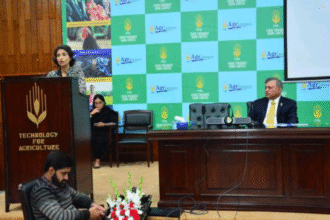The Sustainable Social Development Organization (SSDO) has launched its latest evidence-based report titled “Children’s Understanding of Good Touch and Bad Touch: A Developmental Study,” revealing critical gaps in personal safety awareness among children studying in private schools in Islamabad’s upper-middle-income segment.
Schools Selection Highlights Gaps in Assumed Awareness
The study was conducted across private schools in the Islamabad Capital Territory, chosen under the assumption that children from relatively privileged households would have stronger baseline understanding — an assumption the findings strongly refute.
Methodology Focused on Awareness, Boundaries, and Real Experiences
As part of the research, SSDO administered pre- and post-tests to assess children’s knowledge of safe and unsafe touch, personal boundaries, and harmful behaviours. Interactive qualitative activities encouraged anonymous sharing of real-life experiences, some of which were visually represented through child-drawn illustrations included in the final report.
Findings Reveal Disturbing Gaps in Safety Knowledge
The comparison of pre- and post-test results revealed alarming deficiencies in children’s initial understanding of personal safety. Many participants lacked basic knowledge, pointing to a major communication gap between parents and children — a key factor in children’s vulnerability to unsafe situations.
Anonymous Accounts Show Hidden Harm and Silence
Qualitative insights uncovered serious instances of unsafe and harmful encounters that children had never disclosed to parents, teachers, or caregivers. These findings emphasize the urgent need for structured, age-appropriate education and safe communication spaces.
Consultation With Parliamentarians Strengthens Policy Recommendations
To reinforce institutional response, SSDO held a consultative session with members of the Parliamentary Caucus on Child Rights. Their feedback and guidance contributed significantly to the report’s evidence-based policy recommendations.
Recommendations for Nationwide Child Safety Reforms
The report calls for mandatory body safety education in the national curriculum, comprehensive teacher training, and uniform implementation across public and private schools. It urges nationwide awareness campaigns, parental toolkits, Child Protection Policies at school level, trained focal persons, confidential reporting channels, and integration with provincial child protection units.
Breaking Taboos and Strengthening Community Engagement
The study stresses the importance of destigmatizing conversations on personal boundaries by involving religious scholars, community leaders, and life-skills education initiatives to normalize discussions around children’s safety.
SSDO Reaffirms Commitment to Child Protection
With this report, SSDO aims to spark a national dialogue on child protection education and empower children with the knowledge they need to stay safe. The organization underscores collective responsibility — from families to schools to policymakers — in building a secure future for every child in Pakistan.
Read related news here: https://thepublicpurview.com/category/pakistan-news/
For more stories and insights, visit The Green Post





